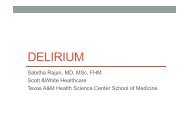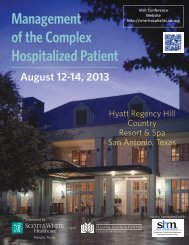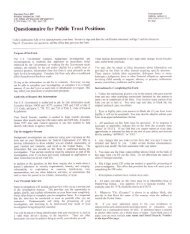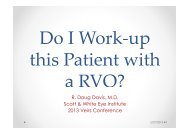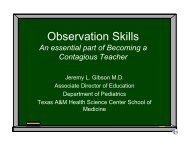Patient Communication Techniques - Healthcare Professionals
Patient Communication Techniques - Healthcare Professionals
Patient Communication Techniques - Healthcare Professionals
- No tags were found...
Create successful ePaper yourself
Turn your PDF publications into a flip-book with our unique Google optimized e-Paper software.
Enhancing <strong>Communication</strong> forBetter <strong>Patient</strong> OutcomesMary Catherine Beach, MD, MPHAssociate Professor of MedicineJohns Hopkins School of MedicineBaltimore, MD
Learning Objectives• By the end of this presentation, participantswill– be able to describe how principles ofmotivational interviewing apply to routinepatient encounters, and– employ techniques for communicating moreeffectively with patients
“The average American physicianconducts between 140,000 –160,000 medical interviews in apractice lifetime, making it the mostfrequently used medical procedure”- Mack Lipkin (1995)
<strong>Communication</strong> and Outcomes inChronic Disease• Positive effect of provider communicationbehaviors on– patient satisfaction– compliance and recall of information– understanding, reassurance and perceivedcontrol over their illness– adherence to therapy– health outcomes
How can we improve ourskills?
Motivational InterviewingA technique of behavior changecounseling
What is Motivational Interviewing?• Encourage and support change byunderstanding patient perspective– Diagnose patient’s current stage of change• Identify and resolve ambivalence• Focus on moving to the next stage ofchange
Tran-theoretical Model of Behavior ChangePrecontemplationRelapseContemplationMaintenanceAction
Motivational Interviewing:Cigarette Smoking Example“Tell me what is goodabout smoking for you?”Precontemplation“That’s great that you’rethinking about quitting.Let’s talk about your plan.”RelapseContemplation“We can learn valuablethings from thisexperience that willhelp us for the nexttime you try.”MaintenanceAction“You’re doing a greatjob. Is there anythingwe need to do tomodify the plan?”
Key <strong>Communication</strong> Skills• Explore perspectives• Express empathy• Resist the righting reflex• Empower
Overarching GoalTake away 1-2 techniques to try inyour next patient encounter.
Exploring <strong>Patient</strong> Perspectives
Exploring <strong>Patient</strong> Perspectives• What do you think is causing the problem?• What have you done to treat this illness so far?– How does it work?
Exploring <strong>Patient</strong> Perspectives• What do you think is causing the problem?• What have you done to treat this illness so far?• Have you seen other doctors? What have otherstold you about this problem?
Exploring <strong>Patient</strong> Perspectives• What do you think is causing the problem?• What have you done to treat this illness so far?• What worries or concerns you most about thisproblem?
Exploring <strong>Patient</strong> Perspectives• What do you think is causing the problem?• What have you done to treat this illness so far?• Have you seen other doctors? What have otherstold you about this problem?• What worries or concerns you most about thisproblem?• How were you hoping I could help you most?
Exploring <strong>Patient</strong> Perspectives• What do you think is causing the problem?• What have you done to treat this illness so far?• Have you seen other doctors? What have otherstold you about this problem?• What worries or concerns you most about thisproblem?• How were you hoping I could help you most?• How do you think these medicines are working foryou?
Non-adherence• Multiple reasons for non-adherence• Voluntary and involuntary reasons coexist• Hierarchy or dependency– If a patient doesn’t believe that medication will help,focusing on remembering won’t help much– Believing that medication is good for you is necessarybut not sufficient• Look for reasons for voluntary non-adherence
Voluntary Non-adherence• Not convinced it is really needed• Doesn’t think it is working• Having a side effect or possible side effect• Stigmatized by the diagnosis• Stigmatized by medication taking• Bad press for other medicines: Vioxx and Avandia• Thinks they are on too many medicines• Just doesn’t like taking medications• Conspiracy theories
Involuntary Non-adherence• Misunderstood instructions• Cost problems• Forgetting doses• Forgetting to get refills• Irregular schedule• Working, childcare, etc.• Problems with personal organization
Failure to Explore• D: What do you do in the mornings? Do you eatsomething?• P: No.• D: You’re going to have to take the time. So Iwant you to get a cover for your toothbrush. Iwant you to. Whether it’s a piece of paper orsomething, that you can not brush your teeth, untilyou think about taking that cover off, cause youcan’t stick it in your mouth with the paper cover onit or a case on it or something.• P: mm hmm.
What’s Wrong?• Physician never asked the patient whythey were having trouble taking theirmedications, assumed patient wasforgetting• Need to understand the nature of theproblem before you attempt to ‘solve’ it– “How do you think these medications areworking for you?”
“People almost never changewithout first feeling understood”-Difficult Conversations: How todiscuss what matters most
“When you are listening, even if itis just for a minute, you have noother immediate agenda than tounderstand the other person’sperspective and experience.”Rollnick et al.Motivational Interviewing in <strong>Healthcare</strong>
Express Empathy
EmpathyEmpathy is a response that demonstratesan accurate understanding and acceptanceof the patient’s feelings or concerns.Wells, K. B., M. C. Benson, et al. (1985). "A model for teaching the briefpsychosocial interview." Journal of Medical Education 60(3): 181-188.
EMPATHIC OPPORTUNITY<strong>Patient</strong>: After I had my hysterectomy. I was takingestrogen, right?Physician: Yeah?<strong>Patient</strong>: You know how your breast get real hard andeverything? You know how you get sortascared?Physician: How long were you on the estrogen? MEO<strong>Patient</strong>: Oh, maybe about six months.Physician: Yeah, what, how, when were you, when did youhave the, uh, hysterectomy?Suchman, A. L., K. Markakis, et al. (1997). "A model of empathic communication inthe medical interview." Jama 277(8): 678-682.
MISSED EMPATHIC OPPORTUNITY (MEO)<strong>Patient</strong>: After I had my hysterectomy. I was takingestrogen, right?Physician: Yeah?<strong>Patient</strong>: You know how your breast get real hard andeverything? You know how you get sortascared?Physician: How long were you on the estrogen? MEO<strong>Patient</strong>: Oh, maybe about six months.Physician: Yeah, what, how, when were you, when did youhave the, uh, hysterectomy?Suchman, A. L., K. Markakis, et al. (1997). "A model of empathic communication inthe medical interview." Jama 277(8): 678-682.
Are we good at empathy?• Physicians ‘missed’ empathic opportunitiesin 72% patient visits• Visits with ‘missed’ empathic opportunitiesaveraged 3 minutes LONGER than visitsin which empathy had been expressed• In 53% of visits with missed opportunities,the patient brought up the same concernmore than onceLevinson W et al. A study of patient clues and physician responses in primary careand surgical settings. JAMA 2000;284:1021-7
Why do we miss so manyempathic opportunities?– Failure to recognize opportunity– Sense that it will take too much time– Sense of feeling unskilled– Difficulty dealing with strong emotions– Belief that detached concern is better– Belief that emotions are not our job
“It is so scary when something like that happens to someone inour own family, isn’t it?
“I have learned that people willforget what you said, people willforget what you did, but peoplewill never forget how you madethem feel.”- Maya Angelou
The Effect of Empathy onOutcomes of CareMaternal Visit Outcomes by Exposure toDifferent Levels of Empathy*VisitSatisfactionReductionin ConcernHighEmpathyLow Empathy P-value80.6 ± 4.9 75.1 ± 7.1
Resist the ‘Righting Reflex’
The Righting Reflex• D- What are we going to do with you? You keep onmissing appointments• P-I came that day but I thought it was earlier in the day.• D- Well, you missed in August and July. My concern isthat back when I saw you in June, we knew then that wepretty urgently needed to make some changes.… What’sup?• P-I’ve been busy with the kids…looking for work becauseI’m unemployed now.• D- So what happens if you get sick and aren’t there toeven look for work or be busy with the kids if you don’tcare for yourself.• P- I promise I am going to be better.
• D: Well, these have the time, you have pretty much chronology that you’re taking them around the same time.They’re a couple here that you took in the late, uh later. Uh, in May, the times are off. But this is the big, this is thebig, you hafta be, you hafta do better and I don’t want to make this the focus of your life, when to take yourmedications and when not to take your medications, it should be routine. It should be part of the day, taking yourmedications because there’s gonna be a time, when you’re gonna, when these medications are gonna fail, when thishappens and if they fail then there’s nothing, you know there’s nothing we can do.• P: Mmhmm• D: All of us who practice have patients that have so much drug resistance and that there’s no drugs. You hafta takeshots, you have to take T20 and that doesn’t give you a very good lifetime. You know, my goal with you is to keepyou healthy for as long as possible.• P: Mmhmm.• D: But you have to, you gotta, really hafta help me.• P: Mmhmm.• D: And I worry, I truly, truly, truly worry because I think that you’re 90% is good, I think there is a way that you could,you could do better. Total percent taken 91%. Percent taken on time 88%. Days with correct doses taken 82%.Total days with all doses taken on time 78%. If it’s not a hundred percent or ninety-five percent it’s just gonna getworse because you’re not dealing with me, you’re not dealing with anybody else, you’re dealing with nature. Mothernature. And Mother Nature is, is, is something you can’t, you cannot deal with, you cannot change. The virus is nota living thing, you know it’s a pathogen. It’s constantly making mutations, looking at ways to fool the body so it cangrow and kill you and what you’re doing is you’re battling, that, that, that machine, that nonliving machine and that’swhat Nature’s doing to you and what you can, this is very, very good, we’re checking this. You can get anything youwant from me, you can get anything you want from a lot of people. You can deal with people, you can deal with, um,bad situations, you know the electric company and uh, you know, the insurance company this that and the otherthing. You can’t deal with Nature.• P: Mmhmm.• D: You can’t deal with Nature. The only way to deal with nature is to take these medications and uh, I really truly amconcerned. If you think you can go to bed and forget to take the medications. You think you can do all these thingsand still stay alive, it’s a mistake because at some point, you’re gonna come back and you’re gonna tell me, whydidn’t you tell me doctor, when I had the chance to take the medications. Why didn’t you let me know the severity ofthe problem. Why didn’t you make me take the meds one hundred percent. Well I’m doing that now. I’m just tellingyou can’t do this.• P: Mmhmm.
Resist the Righting Reflex• The situation– Helping profession: desire to set things right,heal, prevent harm, promote well-being– Urge to correct another’s course is automatic,reflexive
Resist the Righting Reflex• The situation– Helping profession: desire to set things right,heal, prevent harm, promote well-being– Urge to correct another’s course is automatic,reflexive• The problem– All people have the tendency to resist persuasion– Verbalization of counter argument, defend statusquo– People never tell you the truth because when they dothey get corrected, or get a lecture
So how do you inform oreducate patients?• When you are pretty sure you have the rightdiagnosis (what the real problem is)
So how do you inform oreducate patients?• When you are pretty sure you have the rightdiagnosis (what the real problem is)• After you have expressed yourunderstanding of the patient’s perspective– “It sounds like your life just got so stressful for atime that you just didn’t have time to take yourmedications. It just fell to the bottom of yourpriority list”
So how do you inform oreducate patients?• When you are pretty sure you have the rightdiagnosis (what the real problem is)• After you have expressed yourunderstanding of the patient’s perspective• Ask permission before giving advice– “Do you mind if I share some of my concernsabout this?
Empower
Empowerment• Allow patient to take control of biomedicalinformation (Ask before tell…)– What have you been told about the effects ofdiabetes on your body?– What can I tell you about diabetes that wouldbe helpful?
Empowerment• Allow patient to take control of biomedicalinformation (Ask before tell…)• Identify and build on their strengths– “Tell me more about the time when you wereable to take your meds every day.”– “I think it’s great that you came in today…”
Disempowerment• P: You wait and see. You’ll see me looseweight, you’ll see, you’ll be proud of me again.You wait, and I’ll be proud of myself too becauseI feel better than life• D: I hate to say this but I just, I keep hearing thisover and over again• P: I understand• D: and it’s time to walk the walk as they say.• P: I know I understand ok
Empowerment• Allow patient to take control of biomedicalinformation (Ask before tell…)• Identify and build on their strengths• Help patients control over how they canmake a difference in their own health– “What do you think you want to do?”– “What have you tried so far?”– “What can I do to help”
Reflections on this Approach• Take more time?• Make medical practice more fun?– Your job is not to ‘make’ patients moreadherent…just understand and help themproblem-solve
Overarching GoalTake away 1-2 techniques to try inyour next patient encounter.



